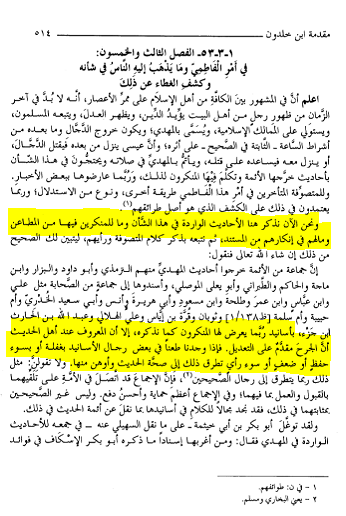بِسۡمِ اللّٰہِ الرَّحۡمٰنِ الرَّحِیۡمِ
والصلاة والسلام على نبيه الكريم
There is a growing trend among a section of Muslims, affected by the poison of modernism and materialism, who are skeptical about the prophecy of the advent of the promised Mahdi عليه السلام
It is argued that Ibn Khaldun (1332-1406 CE) was a denier of the concept of the Mahdi, and that he cast doubt on the authenticity of each and every Hadith concerning the Mahdi. However, this claim is misleading. In reality, Ibn Khaldun never explicitly stated that he rejected belief in the Mahdi. On the contrary he admitted that this belief is the belief of the masses of the people of Islam throughout the ages:
اعلم أنّ في المشهور بين الكافّة من أهل الإسلام على ممرّ الأعصار أنّه لا بدّ في آخر الزّمان من ظهور رجل من أهل البيت يؤيّد الدّين ويظهر العدل ويتبعه المسلمون ويستولي على الممالك الإسلاميّة ويسمّى بالمهديّ
"Know that it has been commonly accepted among the masses of the people of Islam throughout the ages that there must be at the end of time the appearance of a man from the People of the House who will help the Din and make justice triumphant and whom the Muslims will follow and who will gain control over the Islamic lands, and who will be called the Mahdi." (Muqaddimah; v.1, ch.53, p.514)
However, it is true that Ibn Khaldun criticized and regarded as weak or fabricated the vast majority of narrations concerning the Fatimid Mahdi:
ونحن الآن نذكر هنا الأحاديث الواردة في هذا الشّأن وما للمنكرين فيها من المطاعن وما لهم في إنكارهم من المستند
"Here we will now mention the hadith which are narrated about this matter and what matters those who deny them have which would invalidate them, and what hadiths with isnads they have with which to oppose them"
بأسانيد ربّما يعرّض لها المنكرون كما نذكره إلّا أنّ المعروف عند أهل الحديث أنّ الجرح مقدّم على التّعديل فإذا وجدنا طعنا في بعض رجال الأسانيد بغفلة أو بسوء حفظ أو ضعف أو سوء رأي تطرّق ذلك إلى صحّة الحديث وأوهن منها
"with isnads which those who deny (the Mahdi) object to, as we shall mention, except that it is well known to the people of hadith that (the factors which cause the) invalidation (of a hadith narrator) take precedence over the (the factors which result in the) attribution of veracity (to him), so that when we find a flaw in some of the men in the isnads because of carelessness, bad memory, weakness or a bad view that will find a way (to affect) the soundness of the hadith and will weaken it." (ibid):
After a lengthy examination on the narrations about the Mahdi, Ibn Khaldun concludes by saying:
فهذه جملة الأحاديث الّتي خرّجها الأئمّة في شأن المهديّ وخروجه آخر الزّمان. وهي كما رأيت لم يخلص منها من النّقد إلّا القليل والأقلّ منه
"This is the sum total of the hadith which the Imams related concerning the Mahdi and his appearance at the end of time. As you see they are not free of criticism except for a few which are the very least of them." (ibid, p.532):









No comments:
Post a Comment